
Congratulations on graduating from ICAN Learn’s Diploma of Financial Counselling course, Jenny!
Can you tell us about your journey to becoming a Financial Counsellor?
I completed the Diploma in Community and Human Services when I first started in community services 25 years ago. I worked in various roles including Tenants Queensland and Qld Statewide Tenant Advice (QSTARS) and worked with financial counsellors at other agencies around tenancy debts. Some of the base subjects in my original diploma were very similar to the Diploma of Financial Counselling, so I had some transferrable skills.
Is the role of Financial Counsellor what you thought it would be?
Because of my previous work with financial counsellors I thought I had an idea, but I really didn’t understand the breadth of the role and the diversity of issues that come through the door! We also get a lot of referrals from other agencies as they see the whole wrap around service that ICAN offers to help someone on their journey to financial independence.
So it’s not just about the money?
Most people, regardless of what their income is, have had a time when they’ve lost sleep over money. So it’s not so much about the money as it is about the strategies and relationships people have, including their relationship with money. We look at their emotional wellbeing, how they’re coping, what connections they have, what resources they have available to them, so it’s more than just going through income and expenses. We want them to leave us stronger than when they started, with more awareness of themselves and their options, so we focus on the person as much as the debt. Information is a very powerful tool.
Are those strategies taught as part of the Diploma of Financial Counselling?
The Diploma course is a great introduction for people new to the community sector as it gets them in right mindset to understand that as an advocate you’re not there to fix someone’s problems for them, but to walk the path with them. It’s about learning to empower people by helping them recognize their own skills, strengths, and motivation to get through a difficult time in their lives, as well as providing the practical solutions.
What motivates you as a Financial Counsellor?
Before I started with ICAN I worked with RESPECT and one of my fellow members nominated me for a community award and said ‘you’re the Robin Hood of power! You take the power off the powerful and give it to the disempowered’. So when someone comes to ICAN blaming themselves for a debt spiral, like a $5K car loan that’s actually $25K, I can show them that although they had a part to play in signing the contract, predatory lenders will bypass consumer laws to take advantage of people. Once they see that their guilt starts to lift and you watch them grow in knowledge and understanding. It’s always amazing to witness the change in someone once that light goes on and we get a great outcome for them, it’s what the job is all about.
What would you say to someone who is considering studying the Diploma?
Go for it! It’s an excellent opportunity, especially for people coming into community services, because money is everywhere. Whether someone works in legal services or a homeless housing support service, the relationship people have with money is going to come up wherever you are. ICAN Learn also understand the barrier of distance and the challenges of online training, so it’s great for people in rural and regional areas where more services are needed. There’s so much diversity amongst the students as well, where they’re from, what they do – camaraderie and mutual support is amazing.
How has the Financial Counselling qualification made a difference to you?
Completing the Diploma and getting my qualification has been a journey that has led me to a point where I feel very comfortable and confident in my role, thanks ICAN Learn and the whole ICAN team. We’re a very diverse bunch with strengths across many different areas, so we can really support each with the mix of casework to get great outcomes. We really do care about the people that walk through the door, and that feeds into the systemic advocacy. We get seats at the table because individually as financial counsellors we get supported by the organisation in advocating for system change that has a flow on effect to the people we work with and care about. These are our communities – we live in these communities too – so when we fight for system change we do it because it’s our friends, neighbours, and family that are affected. It’s all about the people that walk through our door asking for help, they’re our No 1 priority.


